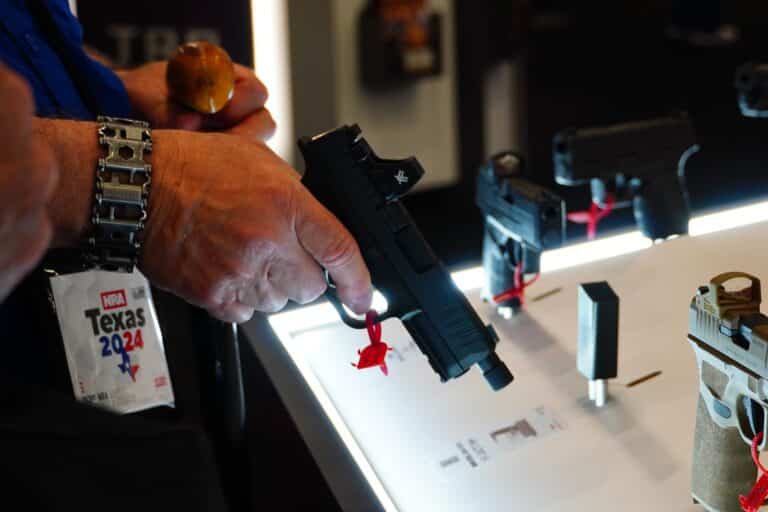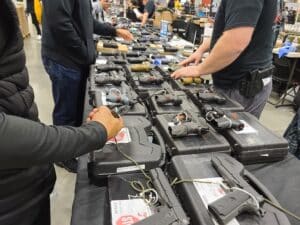Gun voters are likely to benefit as a new Republican trifecta takes hold of the federal government in the wake of the 2024 election. Yet gun policy didn’t seem to have much to do with the outcome of the vote.
None of the major exit polls from election night mentioned the issue, either because pollsters believed it wasn’t worth asking about or because voters didn’t broach the subject.
Only the Fox News Voter Analysis survey, which differs from a traditional exit poll, featured any indication of how gun policy played a role in people’s votes. It found just four percent of the electorate rated it as their most important issue, tied for eighth among the nine issues offered.
Those results align with survey data in the months leading up to the election. Fox’s polling in February, August, September, and October consistently found gun policy as a bottom-tier issue cited by 3-4 percent of voters. Two separate September YouGov polls found the same.
So, why is that?
The first clues point to pocketbook or other social concerns drowning out gun policy. Pre-election issue polling continued to identify issues like the economy, inflation, foreign policy, and abortion at the top of voters’ minds, and the election results seem to have borne that out. Post-election exit polls have pointed to the economy and immigration dominating among Trump voters, while abortion and democracy dominated among Harris voters.
Additionally, the top-of-the-ticket candidates themselves were imperfect vessels for carrying a gun policy message. Kamala Harris launched her campaign with an aggressive gun-control platform but quickly had that muddled by her need to assuage voters over her more draconian past positions. Her closing gun message down the home stretch ended up being much more about her personal Glock ownership and willingness to shoot home intruders to appeal to moderates than policy promises.
Donald Trump ran as a defender of gun rights while being legally barred from owning a gun himself due to his felony convictions. He drew contrasts between himself and Harris on guns but didn’t emphasize the issue prominently down the stretch or make any new public policy promises. Instead, Trump primarily hectored gun owners for their, in his view, unreliability in turning out to vote. And that was after he helped steer Republicans into removing gun-rights policy promises from their 2024 platform.
Broader societal shifts also aligned in a way that reduced the salience of guns as a political issue. Based on preliminary data, murder and other violent crimes appear to have continued their historic decline this year after historic spikes in 2020 and 2021.
2024 also saw a massive drop in the number of high-profile mass shootings that tend to bring gun policy to the forefront of America’s political consciousness.
According to The Violence Project—which tracks incidents in which four or more people are shot and killed, excluding the shooter, in a public location, with no connection to underlying criminal activity, such as gangs or drugs—there have only been three such incidents this year. That’s the fewest since 2020 and the second-lowest total since 2002.
Beyond mass shootings, the most high-profile shooting incident of any kind was the first assassination attempt on Donald Trump, in which an AR-15-wielding gunman wounded him at a Pennsylvania rally. However, Trump quickly rejected any attempt to use the shooting as a push for new gun laws, and the story promptly dissipated from this year’s rapidly shifting news cycle.
None of this is to say that gun policy couldn’t have made a difference in the outcome of the race. After all, Trump won with increased support from working-class, non-college-educated voters, a demographic that tends to own guns at a higher-than-average rate and oppose stricter gun laws. Key to his victory was the outcome of seven swing states—Nevada, Arizona, Georgia, North Carolina, Pennsylvania, Michigan, and Wisconsin. Each of those states has a strong hunting and gun culture. They were all decided by low single-digit percentage points, meaning even a small number of motivated gun voters could have plausibly helped to make the difference.
It is also not to say that guns won’t matter as a policy priority post-election. The incoming Trump administration will likely appoint “pro-gun” judges and claw back some of the Biden administration’s regulatory gun-control measures. It may also pursue legislative reforms depending on the ultimate make-up and ambition of the incoming Congress, though that is less likely.
Still, it’s clear that several circumstances combined to make guns a lower-level issue in the race.






